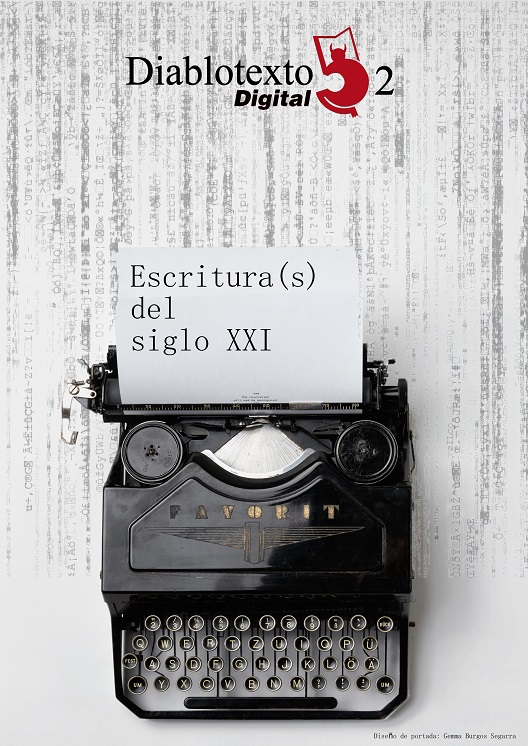The writing of Juan José Millás: a double benefit to the public reader
DOI:
https://doi.org/10.7203/diablotexto.2.10137Keywords:
Juan José Millás, craft of writing, service to the reader, gender’s hybridity, deautomatization Abstract
Abstract
Through a coherent poetic that unfolds continuously between his fiction productions and his collaborations in press, the Valencian writer Juan José Millás places in the forefront the power of the word to transform and even create the world, as for him it is not possible to find a clear border between fiction and reality. The following paper proposes to analyze two of the benefits that the Millás’s writing offers its readers: to mobilize critical judgment and, at the same time, to awaken or rediscover the pleasure of reading.
 Downloads
Downloads
 References
References
ALBERCA, Manuel (2007). El pacto ambiguo. De la novela autobiográfica a la autoficción. Madrid: Biblioteca Nueva.
BEISEL, Inge (1995). “Sobre la relevancia del recuerdo, la escritura y la búsqueda de identidad en la obra narrativa de Juan José Millás”, en: http://cvc.cervantes.es/literatura/aih/pdf/12/aih_12_5_006.pdf [Fecha de consulta: 15 de agosto de 2016].
CASALS CARRO, María Jesús (2003). “Juan José Millás: La realidad como ficción y la ficción como realidad (o cómo rebelarse contra los amos de lo real y del lenguaje) Análisis de Juan José Millás, columnista de El País”, Estudios del Mensaje Periodístico, n.º 9, pp. 63-124.
CHILLÓN, Albert (2006). “Las escrituras facticias y su influjo en el periodismo moderno”, Trípodos, n.º 19, pp. 9-23.
CSIKÓS, Zsuzsanna (2015). “Un género atípico con realidades insólitas: los articuentos de Juan José Millás”, Colindancias. Revista de la red de hispanistas de Europa Central, n° 6, pp. 193-202.
GONZÁLEZ ARCE, Teresa (2008). “Periodismo, ficción y realidad: a propósito de Todo son preguntas, El ojo de la cerradura y Sombras sobre sombras de Juan José Millás”, Alpha. Revista de Artes, Letras y Filosofía, n.º 26, pp. 89-99. http://dx.doi.org/10.4067/S0718-22012008000100006
MARÍN MALAVÉ, María del Rosario (2011). El columnismo de Juan José Millás en relación con su narrativa. Análisis de sus columnas en El país (1990-2008). Tesis doctoral. Universidad de Málaga.
MILLÁS, Juan José (2002). Dos mujeres en Praga. Barcelona: Espasa.
MILLÁS, Juan José (2006). El ojo de la cerradura. Barcelona: Península.
MILLÁS, Juan José (2007). El mundo. Barcelona: Planeta.
MILLÁS, Juan José (2008). “El escritor debe escribir a ciegas”. Entrevista de Silvina Friera, Página/12, 10 de mayo, en https://www.pagina12.com.ar/diario/suplementos/espectaculos/4-10026-2008-05-10.html [Fecha de consulta: 28 de noviembre de 2016].
MILLÁS, Juan José (2010a). “La extrañeza es el motor de mi escritura”. Entrevista de Silvina Friera, Página12, 4 de diciembre, en https://www.pagina12.com.ar/diario/suplementos/espectaculos/4-20139-2010-12-04.html [Fecha de consulta: 28 de noviembre de 2016].
MILLÁS, Juan José (2010b). “Cuando no está claro de dónde procede la voz narradora, a quién pertenece, es muy difícil que la novela se salve del naufragio”. Entrevista de Iván Humanaes Bespín, en http://www.catedras.fsoc.uba.ar/reale/jjmillas.pdf [Fecha de consulta 24 de junio de 2014].
MILLÁS, Juan José (2011). Articuentos completos. Barcelona: Seix Barral.
MILLÁS, Juan José (2014). “El periodista, lo quiera o no, es un escritor”, en: http://www.eldiario.es/cultura/millas-periodista-quiera-escritor_0_291871113.html [Fecha de consulta: 17 de septiembre de 2015]
MILLÁS, Juan José (2016). “El delirio le da sentido a todo”. En Ruiz, Juan Cruz (comp.), Literatura que cuenta. Buenos Aires: Adriana Hidalgo.
MUÑOZ PRIETO, Aída (2016). “Juan José Millás: entre el periodismo y la literatura”. Trabajo de Fin de Grado en Periodismo. Universidad de La Laguna.
PRÓSPERI, Germán (2013). Juan José Millás. Escenas de metaficción. Santa Fe: Ediciones UNL.
SOBEJANO, Gonzalo (1992). “Juan José Millás: fábulas de la extrañeza”. En Villanueva, Darío et al., Historia y crítica de la literatura española, vol. IX: Los nuevos nombres: 1975-1990, Barcelona: Crítica, pp. 249-284.
VALLS, Fernando (2001). “Los articuentos de Juan José Millás en su contexto”. En Millás, Juan José, Articuentos. Barcelona: Alba, pp. 9-18.
ZAVALA, Lauro (2007). “De la teoría literaria a la minificción posmoderna”, Ciências Sociais Unisinos, vol. 43, n.º 1, pp. 86-96, en http://revistas.unisinos.br/index.php/ciencias_sociais/article/view/5651 [Fecha de consulta: 13 de marzo de 2017].
Downloads
Published
How to Cite
-
Abstract1961
-
PDF (Español)1448
Issue
Section
License
Licencia de reconocimiento de Creative Commons “Reconocimiento - No Comercia l- Sin Obra Derivada
Authors who publish with this journal agree to the following items:
The authors will keep their copyright and guarantee the journal the right of first publication of their work, which will be simultaneously subject to the Creative Commons license that allows third parties to share the work indicating its author and its first publication in the journal. The authors may adopt other non-exclusive license agreements to distribute the version of the published work (e.g., depositing it in an institutional telematic file or publishing it in a monographic volume), with an acknowledgment of its initial publication in this journal. The authors are allowed and encouraged to disseminate their work through the Internet (e.g., in institutional telematic archives or on their website) before and during the submission process, which can produce interesting exchanges and increase citations of the published work. (See Effect of Open Access)




